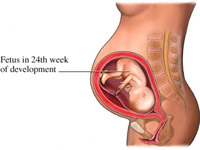Preterm Labor May be Caused by Genes Variation
U.S. researchers have identified DNA variants in mothers and fetuses that appear to increase the risk for preterm labor and delivery.

"A substantial body of scientific evidence indicates that inflammatory hormones may play a significant role in the labor process," Dr. Alan E. Guttmacher, acting director of the National Institute's of Health's Eunice Kennedy Shriver National Institute of Child Health and Human Development said in a statement.
"The current findings add evidence that individual genetic variation in that response may account for why preterm labor occurs in some pregnancies and not in others."
Guttmacher said that like sensitivity to allergens such as house dust or pollen, the severity of the immune response appears to vary from individual to individual, accounting for why some pregnancies end in early labor and delivery.
The findings may one day lead to new strategies to identify those at risk for preterm birth, and to ways to reduce the occurrence of preterm birth among those at risk, Guttmacher added.
The findings were presented at the 30th Annual Society for Maternal-Fetal Medicine meeting by Dr. Roberto Romero, chief of the perinatology research branch and program head for perinatal research and obstetrics at the NICHD.
The UPI com. has contributed to the report.
Subscribe to Pravda.Ru Telegram channel, Facebook, RSS!





